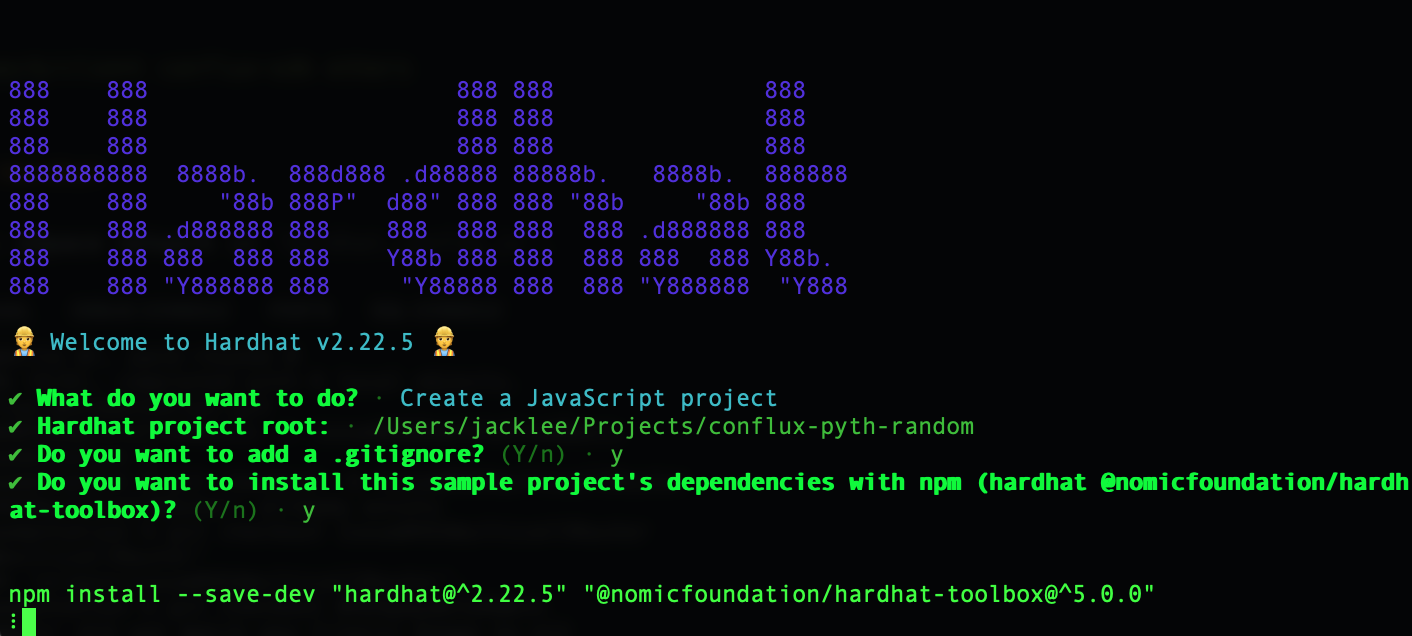Retrieve Random Numbers
This tutorial will guide you through building a project on Conflux eSpace using Hardhat and retrieving random numbers through the Pyth Oracle.
Prerequisites
Before starting, ensure you have the following software installed:
- Node.js and npm
- Hardhat
- ConfluxPortal wallet extension
Step 1: Create a Hardhat Project
First, we need to create a new Hardhat project.
mkdir conflux-pyth-random
cd conflux-pyth-random
npm init -y
npx hardhat init
Follow the prompts and choose the default options to create a basic JavaScript project and install the required dependencies.

Step 2: Install Necessary Dependencies
Install the Pyth client library and Conflux-related dependencies.
npm install @pythnetwork/pyth-sdk-solidity @pythnetwork/entropy-sdk-solidity dotenv
Step 3: Configure Hardhat
Configure the Conflux eSpace network in hardhat.config.js.
require("@nomicfoundation/hardhat-toolbox");
require("dotenv").config();
module.exports = {
solidity: "0.8.4",
networks: {
conflux: {
url: "https://evmtestnet.confluxrpc.com",
accounts: [process.env.PRIVATE_KEY],
},
},
};
Step 4: Write the Smart Contract
Create a file named RandomNumber.sol in the contracts directory and add the following code:
// SPDX-License-Identifier: MIT
pragma solidity ^0.8.4;
import "@pythnetwork/entropy-sdk-solidity/IEntropyConsumer.sol";
import "@pythnetwork/entropy-sdk-solidity/IEntropy.sol";
contract RandomNumber is IEntropyConsumer {
IEntropy private entropy;
constructor(address _entropy) {
entropy = IEntropy(_entropy);
}
// This method is required by the IEntropyConsumer interface.
// It returns the address of the entropy contract which will call the callback.
function getEntropy() internal view override returns (address) {
return address(entropy);
}
// It is called by the entropy contract when a random number is generated.
function entropyCallback(
uint64 sequenceNumber,
// If your app uses multiple providers, you can use this argument to
// distinguish which one is calling the app back.
address provider,
bytes32 randomNumber
) internal override {
// Implement your callback logic here.
uint256 randomNum = uint256(randomNumber);
// Use the random number
}
function getRandomNumber() public payable {
address provider = entropy.getDefaultProvider();
uint fee = entropy.getFee(provider);
// This method returns a sequence number and emits a RequestedWithCallback event.
uint64 sequenceNumber = entropy.requestWithCallback{value: fee}(
provider,
keccak256(abi.encodePacked(block.timestamp))
);
// You can store this sequence number to identify the request in next step.
}
}
When the final random number is ready to use, the entropyCallback function will be called by the Entropy contract. This will happen in a separate transaction submitted by the requested provider. The entropyCallback function should be implemented in the same contract that is requesting the random number.
Step 5: Deploy the Smart Contract
Create a file named deploy.js in the scripts directory and add the following code:
async function main() {
const [deployer] = await ethers.getSigners();
console.log("Deploying contracts with the account:", deployer.address);
// eSpace Testnet
const entropyAddress = "0xdF21D137Aadc95588205586636710ca2890538d5"; // Replace with the actual Entropy contract address
const RandomNumber = await ethers.getContractFactory("RandomNumber");
const randomNumber = await RandomNumber.deploy(entropyAddress);
await randomNumber.waitForDeployment(); // Ensure the contract is deployed
console.log("RandomNumber contract deployed to:", randomNumber.target);
}
main()
.then(() => process.exit(0))
.catch((error) => {
console.error(error);
process.exit(1);
});
You can consult the current Entropy contract addresses to find the address on Conflux eSpace, which is 0xdF21D137Aadc95588205586636710ca2890538d5.
Step 6: Run the Deployment Script
Deploy the contract using the following command:
npx hardhat run scripts/deploy.js --network conflux
Step 7: Interact with the Contract
After deployment, you can interact with the contract using the Hardhat console or a script. For example, create a file named interact.js in the scripts directory:
async function main() {
const [deployer] = await ethers.getSigners();
const RandomNumber = await ethers.getContractFactory("RandomNumber");
const randomNumber = RandomNumber.attach(
"0x9807945B3f004B7b9812FDd4E131693176749e12"
); // Replace with the actual contract address
// Request a random number
const tx = await randomNumber.getRandomNumber({
value: ethers.parseEther("0.01"),
}); // Adjust the value based on the required fee
await tx.wait();
}
main()
.then(() => process.exit(0))
.catch((error) => {
console.error(error);
process.exit(1);
});
Run the script using the following command:
npx hardhat run scripts/interact.js --network conflux
Summary
Through this tutorial, you have learned how to build a project on Conflux eSpace using Hardhat and retrieve random numbers through the Pyth Oracle. For more information, refer to the Pyth Oracle official documentation.